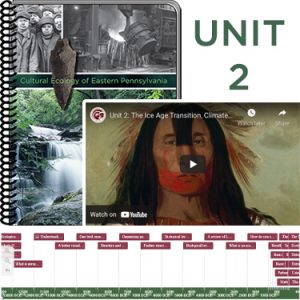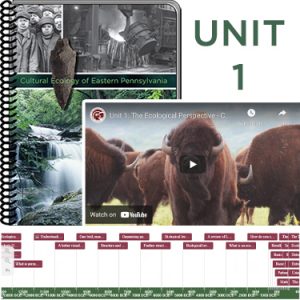3 Curriculum introduction
7 Unit 5 introduction
8 Lesson 1: Cultural landscapes – energy, economics, ecology and the human/nature relationship
8 Lesson 1.1: The cultural landscape as a tool for learning
21 Lesson 1.2: Fossil fuels – transformers of culture and cultural landscapes
31 Lesson 1.3: Ideas, innovation, and cultural change
37 Lesson 1.4: The 3Es – energy, economics, ecology – and the modern human relationship with nature
51 Lesson 1.5: The human ecosystem and adaptive cycle concepts
58 Lesson 2: Development of local cultural landscapes during the Great Acceleration
58 Lesson 2.1: The Great Acceleration, mass consumption, and suburbanization
72 Lesson 2.2: Fates of local industries during the Great Acceleration
80 Lesson 2.3: The Information Age
87 Lesson 2.4: Demographics and the development of local cultural landscapes
100 Lesson 3: Visualizing the Great Acceleration and our role within it
100 Lesson 3 introduction
102 Lesson 3.1: Global consumption overview
107 Lesson 3.2: Pictures of socioeconomic change
109 Lesson 3.3: Take a look at our consumption
126 Lesson 4: Systems thinking – understanding change in the Earth System, carbon cycle, and climate
126 Lesson 4 introduction
126 Lesson 4.1: Earth System changes
131 Lesson 4.2: Changes over time – greenhouse gases and Earth’s energy budget
139 Lesson 4.3: The carbon cycle, systems thinking, and feedbacks
148 Lesson 4.4: Holocene Epoch stability and instability – transition to a new epoch?
158 Lesson 5: Markers of a new epoch – the Anthropocene
158 Lesson 5 introduction158 Lesson 5.1: Marking events in time
162 Lesson 5.2: Local markers: the Mammoth Coal Event
166 Lesson 5.3: Global markers for an Anthropocene Epoch
178 Lesson 6: Living in the Anthropocene
178 Lesson 6 introduction
180 Lesson 6.1: Climate change in the Northeast United States and Southeast Pennsylvania
188 Lesson 6.2: Ecological impacts of climate change
200 Lesson 6.3: Looking at the past to forecast the future
207 Lesson 6.4: What’s at stake? What can be done?
216 Lesson 7: Ecological awareness and the restoration of a healthy environment
216 Lesson 7.1: The value of ecological awareness and understanding
228 Lesson 7.2: Pollutants, environmental laws, regulations
234 Lesson 7.3: Mitigations to remedy past transgressions
252 Lesson 8: Preserving natural heritage and open space – planning sustainable cultural landscapes for the Anthropocene
252 Lesson 8.1: The human-nature relationship and ecological ethics
263 Lesson 8.2: Ecosystem services and the concept of value
267 Lesson 8.3: Ecological literacy, local natural heritage areas, values, and impacts
288 Lesson 8.4: Land-use planning strategies for sustainable cultural landscapes
300 Unit 5 Timeline: Great Acceleration
303 Index
308 Glossary
326 Principal Sources




